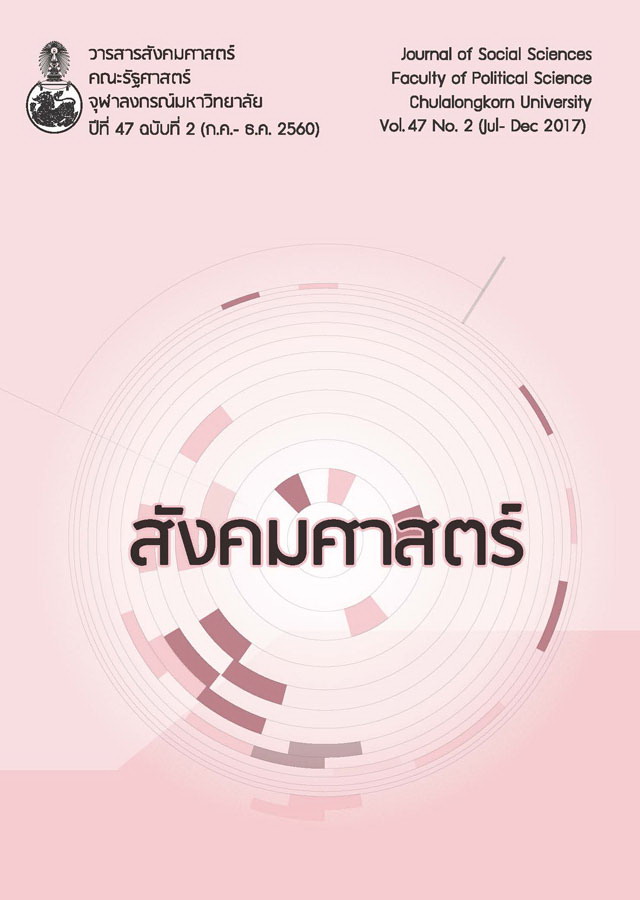Philosophy of Sufficiency Economy: A Philosophical Analysis
DOI:
https://doi.org/10.61462/cujss.v47i2.777Keywords:
HM the Late King Bhumibol Adulyadej of Thailand, philosophy of sufficiency economy, scientific BuddhismAbstract
An analysis of the ideas and concepts of, and within, the “Philosophy of Sufficiency Economy” has been conducted on the presupposition that the ethics of Buddhism and the notion of science are two underlying tenets of this philosophy. The compatibility of ideas between Buddhism and science has been generally recognized, especially on the issue of causality in human experience, but it requires more than an assertion of this compatibility if one wishes to render it meaningful and practical. The philosophy of sufficiency economy is an example of such rendering. The main expression to be analyzed is that sufficiency is to have enough to live on. The key constituents of the analysis are moderation, reasonableness and the Middle Way. The idea of sufficiency entails the notions of moderation and reasonableness. Then, at the level of social ethics, these notions are further linked up with the idea that one must do one’s own duty according to one’s own expertise and in support of one another in a reciprocal manner for the interest of society as a whole if one were to find the good within oneself by one’s own reasoning.
Downloads
References
Bacon, Francis. 2000. The new organon, eds. Lisa Jardine, and Michael Silverthorne. Cambridge: Cambridge University Press.
Bhumibol Adulyadej, King of Thailand. 1998a. “Royal Speech on Wednesday, December 4, 1974.” In Royal Speech on December 4, 1974, 1975, 1976, 1977, 1978. Bangkok: Amarin Printing and Publishing.
-----. 1998b. “Royal Speech on Saturday, December 4, 1976.” In Royal Speech on December 4, 1974, 1975, 1976, 1977, 1978. Bangkok: Amarin Printing and Publishing.
-----. 1998c. “Royal Speech on Monday, December 4, 1978.” In Royal Speech on December 4, 1974, 1975, 1976, 1977, 1978. Bangkok: Amarin Printing and Publishing.
-----. 1999. Royal Speech on Friday, December 4, 1998. Bangkok: Amarin Printing and Publishing.
-----. 2009. Phra-barom-rachovas lae phra-rajadhamras keiyw-kab sasana lae siladham. [Royal address and royal speech of His Majesty King Bhumibol Adulyadej on religion and morality]. Bangkok: Department of Religious Affairs, Ministry of Culture. (in Thai).
Chalmers, A. F. 1999. What is this thing called science? 3rd ed. Indianapolis: Hackett Publishing Company.
Cohen, Morris R., and Ernest Nagel. 1968. An introduction to logic and scientific method. New Delhi: Allied Publishers Limited.
Derry, Gregory N. 1999. What science is and how it works. Princeton, NJ: Princeton University Press.
Edelstein, Ludwig. 1966. The meaning of Stoicism. Cambridge, Mass.: Harvard University Press.
Harvey, Peter. 1992. An introduction to Buddhism: Teachings, history and practices. Cambridge: Cambridge University Press.
Kanchanapisek Network. 1999. “Biography of His Majesty King Bhumibol Adulyadej.” The Golden Jubilee Network Online Mass-Educational Project. http://www.kanchanapisek.or.th/biography/index.en.html. (Accessed on May 13, 2015).
Khantipãlo, Bhikkhu, trans.1986. A criterion of true religion: Lord Buddha's discourse to the Kalama People (Kãlãma Sutta). Bangkok: Mahãmakut Rãjavidyãlaya Press.
Kuhn, Thomas S. 1996. The structure of scientific revolutions. 3rd ed. Chicago: The University of Chicago Press.
Kyabgon, Traleg. 2014. The essence of Buddhism: An introduction to its philosophy and practice. Boston, MA: Shambhala.
Lopez, Donald S. 2008. Buddhism and science: A guide for the perplexed. Chicago, IL: University of Chicago Press.
Sellars, John. 2006. Stoicism. Durham: Acumen.
Thera, Nyanaponika, ed. 2008. Advice to Rãhula: Four discourses of the Buddha. Kandy, Sri Lanka: Buddhist Publication Society.
Wallace, B. Alan. 2003. Buddhism and science: Breaking down the barriers. In Buddhism and science: Breaking new ground. ed. B. Alan Wallace, 1-29. New York, NY: Columbia University Press.
Downloads
Published
How to Cite
Issue
Section
License
Copyright (c) 2017 Faculty of Political Science, Chulalongkorn University

This work is licensed under a Creative Commons Attribution-NonCommercial-NoDerivatives 4.0 International License.
Public Licensing Terms
Copyright and Licensing Policy
The Chulalongkorn University Journal of Social Science publishes all content under the Creative Commons Attribution-NonCommercial-NoDerivatives 4.0 International License (CC BY-NC-ND 4.0).
Copyright
All published articles in the Chulalongkorn University Journal of Social Science are the copyright of the Faculty of Political Science, Chulalongkorn University. Authors transfer all rights to the journal upon acceptance of their manuscript for publication.
CC BY-NC-ND 4.0 License
Under this license:
-
Attribution (BY): Users must give appropriate credit to the authors, the Faculty of Political Science, Chulalongkorn University, and the Chulalongkorn University Journal of Social Science, provide a link to the license, and indicate if changes were made. They may do so in any reasonable manner, but not in any way that suggests the licensor endorses them or their use.
-
NonCommercial (NC): Users may not use the material for commercial purposes. Commercial use requires prior written permission from both the authors and the Faculty of Political Science, Chulalongkorn University.
-
NoDerivatives (ND): If users remix, transform, or build upon the material, they may not distribute the modified material. Adaptations of the work require prior written permission from both the authors and the Faculty of Political Science, Chulalongkorn University.
Open Access Statement
The Chulalongkorn University Journal of Social Science provides immediate open access to its content on the principle that making research freely available to the public supports a greater global exchange of knowledge. Users are allowed to read, download, copy, distribute, print, search, or link to the full texts of the articles without asking prior permission from the publisher or the author, in accordance with the CC BY-NC-ND 4.0 license.
Self-Archiving Policy
Authors may archive the final published version, preprints, or postprints of their articles in institutional repositories or on their personal websites, provided that they acknowledge the original publication in the Chulalongkorn University Journal of Social Science with a complete citation and a link to the journal's website.
Permissions
For any use beyond those covered by the CC BY-NC-ND 4.0 license, please contact:
Editorial Office
Chulalongkorn University Journal of Social Science
Faculty of Political Science, Chulalongkorn University
Email: cusocscij@gmail.com
For more information about the Creative Commons Attribution-NonCommercial-NoDerivatives 4.0 International License, please visit: https://creativecommons.org/licenses/by-nc-nd/4.0/





